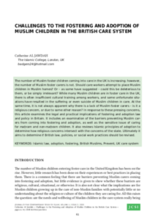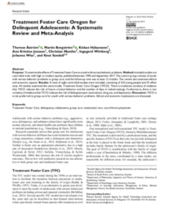Displaying 571 - 580 of 2221
This article examines the legal and practical implications of fostering and adoption law and policy in Britain. It includes an examination of the barriers preventing Muslim carers from coming into fostering and adoption, as well as the sensitive issue of caring for maḥram and non-maḥram children.
This study aimed at investigating the incidence of placement breakdown in Flemish family foster care (Dutch speaking part of Belgium) for unaccompanied children (UC), and to explore the association of breakdown with foster child, foster family and case characteristics.
The aim of this paper is to examine the effects of Treatment Foster Care on youth with serious behavior problems.
This population‐based register‐linkage study assessed the likelihood of OHC placement in different gestational age groups using multivariable Cox regression models.
This study reports on trans adults’ fears of discrimination and openness to child characteristics in the adoption/foster care process in the U.S., relative to cisgender sexual minority parents.
The objectives of this study were: (a) to identify the rate of placement breakdown in Spain, understood as the unplanned termination of a foster placement; (b) to explore the variables associated with foster placement termination, and finally (c) to determine to what extent each variable can explain placement breakdown.
This book outlines narrative and dramatic approaches to improve vulnerable family relationships. It provides a model which offers new ways for parents to practise communicating with their children and develop positive relationships.
The aim of this study is to explore foster child characteristics and the acceptance of foster children, by birth children and to compare mothers’ perceptions to birth children’s own perceptions.
This article arises from an EdD thesis (Horsburgh, 2018) that sought to describe research undertaken to address a perceived gap in the literature by carrying out a detailed examination of the classroom learning of seven primary school aged, care‐experienced children.
This randomized control trial aimed to assess how much Teach Your Children Well (TYCW) - a tutoring program that enhances the academic skills of children in care - tutoring is enough to accelerate learning.


